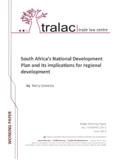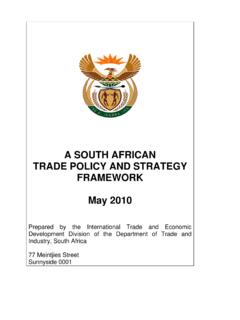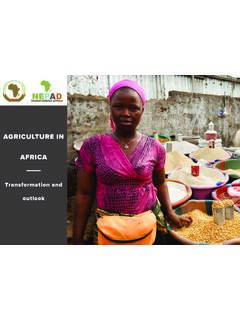Transcription of The National Development Strategy - tralac
1 The National Development Strategy (NDS) This is the National Development Strategy from the Ministry of Economic Planning and Development , Government of swaziland . The purpose of the NDS is to formulate a Vision and Mission Statement with appropriate strategies for socio-economic Development for the next 25 years and provide a guide for the formulation of Development plans and for the equitable allocation of resources. It is designed to strengthen the Government s Development planning and management capacities and anchor it firmly to a National consensus on the direction of future developments in the country. Table of Contents 1. INTRODUCTION 2. VISION 3. KEY MACRO STRATEGIC AREAS Sound Economic Management Economic Empowerment Human Resource Development agricultural Development Industrialisation Research for Development Environmental Management 4.
2 SECTORAL STRATEGIES PUBLIC SECTOR MANAGEMENT Role of Government Public Sector Management and Human Resource Management Labour Relations MACRO-ECONOMIC MANAGEMENT Economic Growth Public Enterprises PHYSICAL INFRASTRUCTURE Roads Road Transport Rail Civil Aviation Cableways and Telecommunications Postal Services The Media Fuel and Energy Environment Water and Sanitation Water Resource Development Human Settlements and Shelter AGRICULTURE, LAND AND RURAL Development Agriculture Land Rural Development ECONOMIC SERVICES Mining Commerce and Industry Construction Tourism and Recreation Financial Services EDUCATION AND TRAINING Education and Training POPULATION, HEALTH AND SOCIAL WELFARE Population Health Social Security and Welfare Swazi Society and Culture Poverty GENDER AND DISADVANTAGED GROUPS Gender Disadvantaged Groups Persons with Disabilities Children Youth Elderly 1.
3 INTRODUCTION For twenty years after independence ( , since 1968), the social objectives of His Majesty s Government (which were stated as economic growth, self-reliance, social justice and stability), together with the policies and strategies for achieving them, were laid down in successive five-year National Development plans and in subsequent three-year rolling Development plans. This period also saw good economic progress and remarkable political stability. In 1988, Government decided to embark on an improved and more comprehensive planning system designed to meet emerging serious challenges. The National Development Strategy (NDS) is part of this new planning system. The process of compiling the NDS started by the collection of views from the general public which was accomplished through the appointment of the Economic Review Commission (ERC) by His Majesty.
4 The report of the ERC, published in 1995, solicited a National consensus and came up with recommendations which called for the formulation of strategies for satisfying the aspirations of the nation. Following completion of the Economic Review Commission exercise which was the first phase of the NDS process, eight sector committees were charged with the responsibility of giving in-depth analysis to specific areas. The idea was to provide background material to guide strategic thinking in the formulation of the vision and the long-term National Development Strategy for the country. Following the nomination of stakeholder representatives the consultation process was further strengthened by the appointments made by His Majesty to the stakeholders group. The representatives were entrusted with the responsibility of articulating a long-term vision, identifying the key areas of Development against which National resources will be allocated and the formulation of macro and sectoral strategies for the attainment of the vision for the country.
5 The NDS document has been compiled on the basis of the report of the stakeholders group and it will provide a long-term framework (25 years) within which short and medium-term Development plans will be formulated. Flowing from the NDS are social and economic transformation processes which His Majesty's Government has embarked upon - namely, the Economic and Social Reform Agenda (ESRA), the Public Sector Management programme (PSMP) and the Internal Structural Adjustment programme (ISAP). The current three-year rolling Development plan and ESRA I and ESRA II, which are management tools, were prepared by Government on the basis of the draft National Development Strategy . The 2022 Vision was launched by His Majesty King Mswati III. 2. The Vision Following extensive consultations as well as detailed analytical reviews of swaziland s social and economic performances since independence, challenges and opportunities were identified.
6 Consequently the stakeholder representative groups settled on the following vision: "By the Year 2022, the Kingdom of swaziland will be in the top 10% of the medium human Development group of countries founded on sustainable economic Development , social justice and political stability". What this vision states is that twenty-five years from the year 1997, swaziland will have considerably improved its world standing in terms of measurable indices of human Development . In its quest for the improved standing, it will rely on sustainable economic Development ; social justice; and political stability. Underlying the vision is the focus on the quality of life in the country. The critical dimensions of the quality of life are poverty eradication, employment creation, gender equity, social integration and environmental protection. These dimensions are, in turn, crucially linked to education, health and other aspects of human resource Development .
7 These indices can be used to monitor movement towards the vision on a regular basis. Because other countries are also trying to improve their conditions, this vision is actually a moving target. What swaziland is essentially saying is that it wants to move up the ladder for enhancing human capacities. The vision will be attainable if vibrant economy and human and social Development are taken care of. It is within the capacity of the Swazi nation to ensure that conditions necessary for achieving the vision are indeed satisfied. 3. Key Macro Strategic Areas To achieve the vision described above, key macro strategic areas were identified. They are macro in the sense that they are broad and encompass a number of more focussed strategic considerations. Sound Economic Management In the context of the free-enterprise nature of the Swazi economy, the central theme of sound economic management is the creation of an attractive macroeconomic environment to increase investor confidence.
8 This will, in turn, enable the achievement of a number of desirable social objectives such as job creation, poverty reduction, economic empowerment of locals (including women) and environmental management. It will also help sharpen the effectiveness of the other key macro strategies. Important elements of this Strategy are sustainable National budget; full transparency and accountability in the use of public funds; realistic monetary policy taking into account the small size of the economy vis-a-vis the regional economy; creation of adequate physical infrastructure; protection and regeneration of the physical environment; effective and optimum utilization of the natural resource base; maximisation of productive employment opportunities; and bringing regional economic relations to work for the benefit of the Swazi economy. Economic Empowerment Economic empowerment involves raising the capability of various National groupings to widen their choice horizons.
9 Strategic considerations in this area include the following: active promotion of local entrepreneurs to start own businesses or grow in their existing businesses or enter into mainstream business operations through share purchases on a willing-buyer and willing-seller basis; orderly promotion of informal sector activities; rural Development ; assisting disadvantaged groups; and mainstreaming of gender relations in project formulation. Where there are existing structures for economic empowerment they should be streamlined and made to work more efficiently and effectively. Where necessary, existing structures should be introduced. In all cases, there should be sufficient consultation with all stakeholders so that the outcome can receive maximum support. Human Resource Development The importance of human resource Development as a key macro Strategy stems from the fact that human resources are one of the primary resources swaziland has.
10 This resource can only contribute meaningfully to sustainable economic and political Development if its capabilities and qualities are enhanced. Important elements in this Strategy are appropriate education and training (including a reorientation away from the presently academic orientation to technical and vocational orientation); adequate incentives extended to businesses and households to encourage the full Development of human capital; appropriate youth programmes; special attention to members of society with disabilities; and all other areas impacting on the quality of human capital (health, water, sanitation, shelter, etc). agricultural Development swaziland has a comparative advantage in agricultural products because of its good soils, good climatic conditions, potential for more quality agricultural research and competitive wage rates. A large portion of the population will be still deriving its livelihood from agriculture over the next twenty-five years.



















